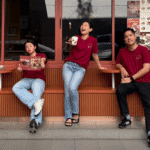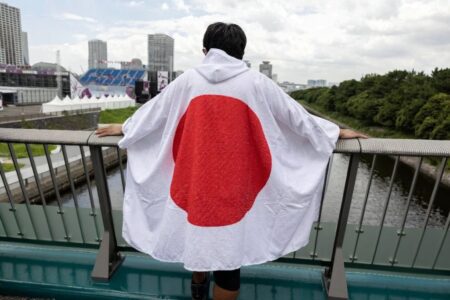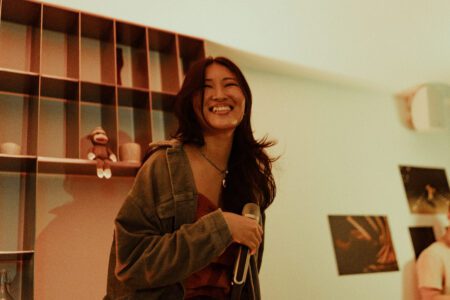
If you hear Mariya Koropenko speak Japanese without seeing her face, you’d likely have no idea that she’s originally from Ukraine.
Born in Crimea, Koropenko moved to Japan in 2014 when she was only 11.
“The Russians came, so we had to flee to another country,” the 22-year-old says.
Her family decided on Japan because her parents were already working for a Japanese company. Koropenko, who was in the fifth grade going into the sixth, joined a typical Japanese elementary school.
“As first-generation immigrants, we didn’t have money to send me to international school because they are so expensive here,” she says.
Now, 11 years into her stay in Japan, she’s continued her education in Japanese schools, from junior high to high school to now, Kyushu University where she’s majoring in Physics with a minor in Economics.

Kyushu University is in Fukuoka, Japan. Source: Mariya Koropenko
Growing up in Japan
When Koropenko first got to Japan, international students were still far and few in between. In her elementary school, she was the only foreign student. Pair that with zero knowledge of the Japanese language, and you’ll have a fish out of water.
“Everyone was curious. Just curious about me,” Koropenko reflects. “They didn’t want to be friends with me, but they were curious, you know, just like how kids are.”
Intrigued by her appearance, they would touch her hair, curious about the colour. Koropenko didn’t know Japanese culture either, so she would eat without saying “itadakimasu.” It’s a phrase that Japanese people say before a meal, meaning “I humbly receive” or “I gratefully accept.”
As time passed, she learnt more about the culture, and Japanese people learnt more about her. By the time she was in junior high, she already found it much easier to communicate and make real friends. In high school, she had totally assimilated.
“I could even make friends with whom I wanted to be friends with, not just the other way around. Because you know, when you don’t speak language, you cannot really choose your friends,” she says.
When it came time for university, Koropenko did think about going back to Europe. Even after a decade away, it was home to a culture that felt more familiar to her. Yet, with how expensive European institutions can be, she decided to study in a Japanese university.
“Again, the money problem,” the Ukrainian student in Japan admits. “My parents had to send me to a normal Japanese university, and they said that we can’t pay you for private universities such as Keio or Waseda.”
Despite that, the student has gone on to lead a very productive academic career in Fukuoka as a student in Kyushu University.

Koropenko is a Physics student. Source: Mariya Koropenko
Building a community
Beyond finding her own community, Koropenko created one, too.
Even though she was a physics major, she had only about three hours of physics courses per week. Believing it wasn’t enough, she invited the four girls in her cohort to a study group.
“That was what we did in the first half of the first year in university,” Koropenko recounts. “After that a few more people joined, including boys.”
But she wanted to reach people in other years. Second and third year students would get to experience seminars of their own, but she wanted a place where everyone regardless of year could go learn new things together. So, she started a Discord server and called it Physics Kyudai, which became PhysiKyu.
Quickly, they grew to 20 people just by inviting people who were already doing study groups. They continued assembling more people, even those from different faculties, and hosted information sessions.
After three years, PhysiKyu has grown from just four students to more than 100 active members.

Koropenko is the founder and representative of PhysiKyu. Source: Mariya Koropenko
Supporting fellow Ukrainians
Koropenko is working to enhance her online community even more through her own blog, which will focus on her journey of seeking refuge in Japan, plus her school and university experience.
With many Ukrainians, especially children, forced to migrate and study abroad today, Koropenko hopes to guide them through this journey.
“I did it earlier, so I’m just one of the examples that they can see and maybe learn something for themselves,” she says. “So that would be like a good example for Ukrainian people.”
The blog is written in Ukrainian so it can reach more Ukrainians. She’s also co-working with organisations inside Ukraine to bring the Japanese proficiency test JLPT into her home country.
Koropenko also felt encouraged to create the blog after visiting her relatives in Ukraine during the summer. She felt that the atmosphere was heavy and sad, but she knew they wanted to learn more about her life.
“They wanted to know a lot about Japan, and I couldn’t share everything because the time capacity didn’t allow me to tell them as much as I wanted,” she explains. “So I just wanted them to read my stories through this blog, to maybe make them smile or make their mood better.”
Aside from promoting Japan to Ukrainians, Koropenko is also championing Ukrainian culture in Japan.
For her university festival, she’s in charge of a team who’s making borsch — a staple in Ukraine.
Outside of school, she is working in Ukraine House Japan, which is supported by the Ukrainian Embassy in Japan. Here, she facilitates meetings between Japanese people and Ukrainian people to minimise misunderstandings.










